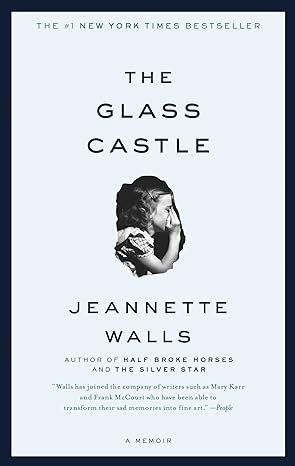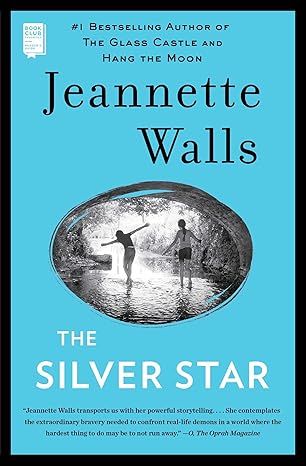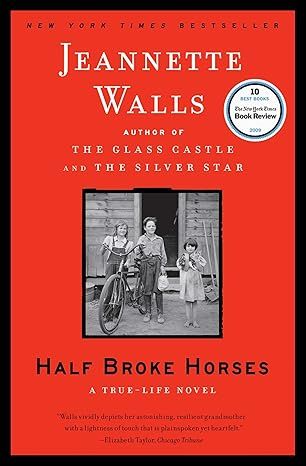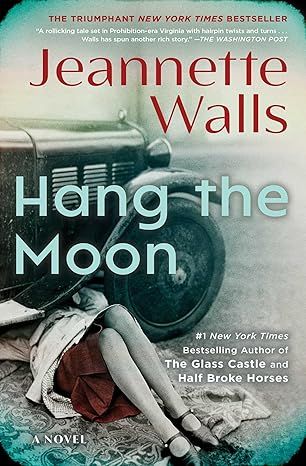The Glass Castle: A Memoir (book)
4.6
-
43,438 ratings
THE BELOVED #1 NEW YORK TIMES BESTSELLER—FROM THE AUTHOR OF HANG THE MOON
The extraordinary, one-of-a-kind, “nothing short of spectacular” (Entertainment Weekly) memoir from one of the world’s most gifted storytellers.
The Glass Castle is a remarkable memoir of resilience and redemption, and a revelatory look into a family at once deeply dysfunctional and uniquely vibrant. When sober, Jeannette’s brilliant and charismatic father captured his children’s imagination, teaching them physics, geology, and how to embrace life fearlessly. But when he drank, he was dishonest and destructive. Her mother was a free spirit who abhorred the idea of domesticity and didn’t want the responsibility of raising a family.
The Walls children learned to take care of themselves. They fed, clothed, and protected one another, and eventually found their way to New York. Their parents followed them, choosing to be homeless even as their children prospered.
The Glass Castle is truly astonishing—a memoir permeated by the intense love of a peculiar but loyal family.
The memoir was also made into a major motion picture from Lionsgate in 2017 starring Brie Larson, Woody Harrelson, and Naomi Watts.
Kindle
$13.99
Available instantly
Audiobook
$0.99
with membership trial
Hardcover
$17.47
Paperback
$9.99
Ships from
Amazon.com
Payment
Secure transaction
ISBN-10
074324754X
ISBN-13
978-0743247542
Print length
288 pages
Language
English
Publisher
Scribner
Publication date
January 16, 2006
Dimensions
5.25 x 0.9 x 8 inches
Item weight
2.31 pounds
Popular Highlights in this book
It’s the Joshua tree’s struggle that gives it its beauty.
Highlighted by 8,132 Kindle readers
Too much hard luck can create a permanent meanness of spirit in any creature.
Highlighted by 4,544 Kindle readers
Life is a drama full of tragedy and comedy, Mom told me. You should learn to enjoy the comic episodes a little more.
Highlighted by 1,967 Kindle readers
Product details
ASIN :
B000OVLKMM
File size :
6191 KB
Text-to-speech :
Enabled
Screen reader :
Supported
Enhanced typesetting :
Enabled
X-Ray :
Enabled
Word wise :
Enabled
Editorial Reviews
From Publishers Weekly
Starred Review. Freelance writer Walls doesn't pull her punches. She opens her memoir by describing looking out the window of her taxi, wondering if she's "overdressed for the evening" and spotting her mother on the sidewalk, "rooting through a Dumpster." Walls's parents—just two of the unforgettable characters in this excellent, unusual book—were a matched pair of eccentrics, and raising four children didn't conventionalize either of them. Her father was a self-taught man, a would-be inventor who could stay longer at a poker table than at most jobs and had "a little bit of a drinking situation," as her mother put it. With a fantastic storytelling knack, Walls describes her artist mom's great gift for rationalizing. Apartment walls so thin they heard all their neighbors? What a bonus—they'd "pick up a little Spanish without even studying." Why feed their pets? They'd be helping them "by not allowing them to become dependent." While Walls's father's version of Christmas presents—walking each child into the Arizona desert at night and letting each one claim a star—was delightful, he wasn't so dear when he stole the kids' hard-earned savings to go on a bender. The Walls children learned to support themselves, eating out of trashcans at school or painting their skin so the holes in their pants didn't show. Buck-toothed Jeannette even tried making her own braces when she heard what orthodontia cost. One by one, each child escaped to New York City. Still, it wasn't long before their parents appeared on their doorsteps. "Why not?" Mom said. "Being homeless is an adventure."
Copyright © Reed Business Information, a division of Reed Elsevier Inc. All rights reserved.
From School Library Journal
Gr 9 Up-Growing up in rural Appalachia in extreme poverty, Walls (a former journalist and recognized author) and her siblings had to fend for themselves, supporting each other as they weathered their parents' wildly erratic and dysfunctional behavior. She presents an objective portrait of her circumstances that is both poignant and forgiving. Audio version available from S & S Audio.α(c) Copyright 2013. Library Journals LLC, a wholly owned subsidiary of Media Source, Inc. No redistribution permitted.
From Bookmarks Magazine
"Being homeless is an adventure," Wallss mom used to say. In her extraordinary memoir, Walls recalls her nomadic life with surprising affectionthough she would not want to relive it. The title, which derives from her fathers dream house, serves as an apt metaphor for the Walls fragility. Yet Walls sheds no tears nor succumbs to self-pityshe probably learned early on they would get her nowhere. Instead of condemning her parents foibles, she unblinkingly examines how they transformed hardship into family romance and adventure. Sharing incredible, painful experiences in no-nonsense prose, Walls has, as The New York Times Book Review notes, "succeeded in doing what most writers set out to doto write the kind of book they themselves most want to read."
Copyright © 2004 Phillips & Nelson Media, Inc.
From Booklist
Starred Review Walls, who spent years trying to hide her childhood experiences, allows the story to spill out in this remarkable recollection of growing up. From her current perspective as a contributor to MSNBC online, she remembers the poverty, hunger, jokes, and bullying she and her siblings endured, and she looks back at her parents: her flighty, self-indulgent mother, a Pollyanna unwilling to assume the responsibilities of parenting, and her father, troubled, brilliant Rex, whose ability to turn his family's downward-spiraling circumstances into adventures allowed his children to excuse his imperfections until they grew old enough to understand what he had done to them--and to himself. His grand plans to build a home for the family never evolved: the hole for the foundation of the "The Glass Castle," as the dream house was called, became the family garbage dump, and, of course, a metaphor for Rex Walls' life. Shocking, sad, and occasionally bitter, this gracefully written account speaks candidly, yet with surprising affection, about parents and about the strength of family ties--for both good and ill. Stephanie Zvirin
Copyright © American Library Association. All rights reserved
Review
"Walls has joined the company of writers such as Mary Karr and Frank McCourt who have been able to transform their sad memories into fine art." — People
"Walls has a God-given knack for spinning a yarn, and The Glass Castle is nothing short of spectacular." — Entertainment Weekly
"Extraordinary." — Time
"Each memory is more incredible than the last... That Walls recounts them so well and in such detail is our good fortune." — The Plain Dealer
"On the eighth day, when God was handing out whining privileges, he came upon Jeannette Walls and said, 'For you, an unlimited lifetime supply.' Apparently, Walls declined His kind offer." — Chicago Tribune
"Charles Dickens's scenes of poverty and hardship are no more audacious and no more provocative than those in the pages of this stunning memoir." — The Atlanta Journal-Constitution
"Some people are born storytellers. Some lives are worth telling. The best memoirs happen when these two conditions converge. In The Glass Castle, they have." — New York Newsday
"The Glass Castle is the kind of story that keeps you awake long after the rest of the house has fallen asleep." — Vogue
About the Author
Jeannette Walls graduated from Barnard College and was a journalist in New York. Her memoir, The Glass Castle, has been a New York Times bestseller for more than eight years. She is also the author of the instant New York Times bestsellers The Silver Star and Half Broke Horses, which was named one of the ten best books of 2009 by the editors of The New York Times Book Review. Walls lives in rural Virginia with her husband, the writer John Taylor.
Read more
Sample
Chapter 1: A Woman on the Street
I was sitting in a taxi, wondering if I had overdressed for the evening, when I looked out the window and saw Mom rooting through a Dumpster. It was just after dark. A blustery March wind whipped the steam coming out of the manholes, and people hurried along the sidewalks with their collars turned up. I was stuck in traffic two blocks from the party where I was heading.
Mom stood fifteen feet away. She had tied rags around her shoulders to keep out the spring chill and was picking through the trash while her dog, a black-and-white terrier mix, played at her feet. Mom's gestures were all familiar -- the way she tilted her head and thrust out her lower lip when studying items of potential value that she'd hoisted out of the Dumpster, the way her eyes widened with childish glee when she found something she liked. Her long hair was streaked with gray, tangled and matted, and her eyes had sunk deep into their sockets, but still she reminded me of the mom she'd been when I was a kid, swan-diving off cliffs and painting in the desert and reading Shakespeare aloud. Her cheekbones were still high and strong, but the skin was parched and ruddy from all those winters and summers exposed to the elements. To the people walking by, she probably looked like any of the thousands of homeless people in New York City.
It had been months since I laid eyes on Mom, and when she looked up, I was overcome with panic that she'd see me and call out my name, and that someone on the way to the same party would spot us together and Mom would introduce herself and my secret would be out.
I slid down in the seat and asked the driver to turn around and take me home to Park Avenue.
The taxi pulled up in front of my building, the doorman held the door for me, and the elevator man took me up to my floor. My husband was working late, as he did most nights, and the apartment was silent except for the click of my heels on the polished wood floor. I was still rattled from seeing Mom, the unexpectedness of coming across her, the sight of her rooting happily through the Dumpster. I put some Vivaldi on, hoping the music would settle me down.
I looked around the room. There were the turn-of-the-century bronze-and-silver vases and the old books with worn leather spines that I'd collected at flea markets. There were the Georgian maps I'd had framed, the Persian rugs, and the overstuffed leather armchair I liked to sink into at the end of the day. I'd tried to make a home for myself here, tried to turn the apartment into the sort of place where the person I wanted to be would live. But I could never enjoy the room without worrying about Mom and Dad huddled on a sidewalk grate somewhere. I fretted about them, but I was embarrassed by them, too, and ashamed of myself for wearing pearls and living on Park Avenue while my parents were busy keeping warm and finding something to eat.
What could I do? I'd tried to help them countless times, but Dad would insist they didn't need anything, and Mom would ask for something silly, like a perfume atomizer or a membership in a health club. They said that they were living the way they wanted to.
After ducking down in the taxi so Mom wouldn't see me, I hated myself -- hated my antiques, my clothes, and my apartment. I had to do something, so I called a friend of Mom's and left a message. It was our system of staying in touch. It always took Mom a few days to get back to me, but when I heard from her, she sounded, as always, cheerful and casual, as though we'd had lunch the day before. I told her I wanted to see her and suggested she drop by the apartment, but she wanted to go to a restaurant. She loved eating out, so we agreed to meet for lunch at her favorite Chinese restaurant.
Mom was sitting at a booth, studying the menu, when I arrived. She'd made an effort to fix herself up. She wore a bulky gray sweater with only a few light stains, and black leather men's shoes. She'd washed her face, but her neck and temples were still dark with grime.
She waved enthusiastically when she saw me. "It's my baby girl!" she called out. I kissed her cheek. Mom had dumped all the plastic packets of soy sauce and duck sauce and hot-and-spicy mustard from the table into her purse. Now she emptied a wooden bowl of dried noodles into it as well. "A little snack for later on," she explained.
We ordered. Mom chose the Seafood Delight. "You know how I love my seafood," she said.
She started talking about Picasso. She'd seen a retrospective of his work and decided he was hugely overrated. All the cubist stuff was gimmicky, as far as she was concerned. He hadn't really done anything worthwhile after his Rose Period.
"I'm worried about you," I said. "Tell me what I can do to help."
Her smile faded. "What makes you think I need your help?"
"I'm not rich," I said. "But I have some money. Tell me what it is you need."
She thought for a moment. "I could use an electrolysis treatment."
"Be serious."
"I am serious. If a woman looks good, she feels good."
"Come on, Mom." I felt my shoulders tightening up, the way they invariably did during these conversations. "I'm talking about something that could help you change your life, make it better."
"You want to help me change my life?" Mom asked. "I'm fine. You're the one who needs help. Your values are all confused."
"Mom, I saw you picking through trash in the East Village a few days ago."
"Well, people in this country are too wasteful. It's my way of recycling." She took a bite of her Seafood Delight. "Why didn't you say hello?"
"I was too ashamed, Mom. I hid."
Mom pointed her chopsticks at me. "You see?" she said. "Right there. That's exactly what I'm saying. You're way too easily embarrassed. Your father and I are who we are. Accept it."
"And what am I supposed to tell people about my parents?"
"Just tell the truth," Mom said. "That's simple enough."
Copyright © 2005 by Jeannette Walls
Read more
About the authors
Jeannette Walls
Jeannette Walls was born in Phoenix, Arizona and grew up in the American Southwest and Welch, West Virginia. She graduated from Barnard College and was a journalist in New York for twenty-five years, writing for New York Magazine, Esquire, and MSNBC. Her memoir, The Glass Castle, has been a New York Times bestseller for more than eight years, has been translated into more than thirty languages and was made into a film starring Brie Larson. She is also the author of the best-selling novels The Silver Star and Half Broke Horses, which was named one of the ten best books of 2009 by the editors of the New York Times Book Review. Her new novel, Hang the Moon, will be published by Scribner in March 2023. Walls lives in central Virginia with her husband, the writer John Taylor.
Read more
Reviews
Customer reviews
4.6 out of 5
43,438 global ratings
T. Konvalinka
5
I devoured this book
Reviewed in the United States on August 8, 2024
Verified Purchase
I saw 20 minutes of the movie on TV one afternoon that was based upon this book and was intrigued by the subject matter. I knew I had to read the memoir, which sounded both unbelievable and profound.
I read the book in one sitting; I didn't want to break my concentration. So many of the experiences of the family seemed both familiar yet foreign. While my upbringing was wildly different from that of the author, the core emotions felt at once relatable and unsettling. This book made me look at my own turbulent childhood with a new sensitivity and compassion.
I highly recommend this book to all; those who have a similar lived experience that want to understand how others have come to terms with it, as well as those who are looking from the outside, in.
Read more
Intrepid Reader
5
Great!
Reviewed in the United States on February 28, 2010
Verified Purchase
Plot/Storyline: 5 Stars
Jeannette Walls' story of childhood abuse is an original one in that, while disturbing, it was not as horrific as some I have read. For this reason, it was a more enjoyable read than I expected, although still very interesting.
Ms. Walls manages to tell of her childhood in a way that is casual about the neglect, much as she seemed to have felt when she was a child. Amazingly, there were very few moments of self-pity. Unlike a lot of memoirs depicting bad childhoods, this one did not appear to be trying to constantly shock the reader. Instead, it just told the story honestly and completely.
The reader is left with many questions regarding her parents' motives. This is not a bad aspect of the book, as it is a reality that she probably cannot fathom their reasoning for most things. My biggest wonder was how her mother was able to obtain a teaching degree, yet seemed to be unable or unwilling to hold a job for more than a few months at a time. Her father was not such an enigma as he was merely an alcoholic.
This was a memoir well worth reading. I had trouble putting it down as I wanted to find out how Ms. Walls managed to rise above such a quagmire of a childhood.
Character Development: 5 Stars
As I stated above, there were very few instances of Ms. Walls delving into self-pity. She did manage, however, to convey her thoughts and feelings on her upbringing. Moreover, she told the story in a progressive manner that made the reader feel similar to how she must have felt at different ages. For instance, as a very young girl, the times of hunger, almost starvation, did not seem to bother her as much as when she was older. The antics of her parents were a source of humor rather than embarrassment, until she was old enough to notice the differences between her family and others.
Her brother, the sibling she was closest to, was the most well developed, but her older sister was well done, also. Her parents were as much of an enigma to the reader as they were to her. Her younger sister did not seem to play much of a role in her life, and, therefore, was only peripherally in the book.
Writing Style: 5 Stars
In a word: Excellent. The story flowed very evenly. The viewpoint matured as little Jeannette matured in the book. The dialogue, while I cannot vouch for it being verbatim, very well could have been, as I could hear her family talking as I read.
Her descriptions were those of an adult, but this was not offputting in the earlier chapters. It merely made for a better read.
Formatting/Editing: 5 Stars
Both were of professional quality.
Rating: PG-13 for hints of Child Molestation, Light Language, Alcoholism
Read more
2 people found this helpful
Dalton O
5
Depressing but Well Written
Reviewed in the United States on September 29, 2023
Verified Purchase
"The Glass Castle: A Memoir" by Jeannette Walls is an unforgettable journey through a life marked by hardship, resilience, and the enduring bonds of family, for better or for worse. This poignant memoir offers readers a captivating glimpse into the tumultuous world of a family struggling with poverty, neglect, and unconventional parenting. I wasn't sure when I first picked up the book, but after only a few pages in, I could not put it down. At its core, this is a coming-of-age story that revolves around Jeannette's unconventional upbringing by her free-spirited, often neglectful, parents. The Walls family lives a nomadic life, constantly on the run from debt, the law, and assumed societal conventions. Jeannette's vivid and candid writing style draws readers deep into her world, painting a vivid picture of their struggles and her complex feelings toward her parents. What sets this memoir apart is its ability to evoke a wide range of emotions. I found myself rooting for her (naturally), then rooting for her mom, and then oscillating wildly to a deep resentment for her parents neglect and frustration at their failures. The author's storytelling is both heart-wrenching and uplifting, leaving you with a profound sense of empathy for her and her siblings. If you've dealt with absentee or neglectful parents, you'll appreciate Jeanette's portrayal of the complicated love she holds for her own parents. Her ability to convey the inner conflict and the enduring bond she shares with her family is a testament to her writing prowess. It's a good book, though be prepared to feel incredibly frustrated at times, and incredibly melancholic at others. Honestly, I'd say this is a must-read for anyone that can relate to the complexities of having absentee or neglectful parents.
Read more
7 people found this helpful
♡
5
𝐎𝐌𝐆...! >ᴗ<
Reviewed in the United States on August 24, 2024
Verified Purchase
got this due to it being on the summer hw but my was this book insanely touching and just amazing! something i will remember for the rest of my life and surely tell others to get it! love this book, 1000000/10 😭♡
3 people found this helpful
Hannah
5
In the memoir, “The Glass Castle”, written by Jeannette Walls. She writes about her childhood, growing up with unorthodox and i
Reviewed in the United States on May 7, 2014
Verified Purchase
Hannah Bauman Dr Vogel English 340 May 7th 2014 The Glass Castle In the memoir, “The Glass Castle”, written by Jeannette Walls. She writes about her childhood, growing up with unorthodox and irresponsible, yet intelligent and talented parents. Moving from one city to another, living in a variety of environments, from a mobile home, to a motel at one point, to an abandon train depot, and then to a rundown miner’s house until her and her siblings moved to New York on their own finally. Their father, a man, who in some aspects could be mistaken for brilliant, is a belligerent drunk, can’t keep a job, and steals his children’s hard earned money, that they are saving to finance a new life in New York City and then spends it on booze. Then a mother who is an artist with a college degree, but refuses to act like an adult and get a job in order to take care of her children. Jeannette and her siblings have no choice, but to fend for themselves and find a way to get themselves out of this terrible dysfunctional environment. For the children of this story growing up was full of unexpected adventures and struggles with consistent poor living conditions. The children would routinely go for days without eating anything, or when they did eat the meals consisted of very poor nutritional value. At one point Jeannette and her brother have to dig through the school garbage container for leftover food. This often led to the kids being bullied and/or ridiculed by their peers because of their social status and unkempt appearance. However, even with these misfortunes the children managed to excel in school. Despite their unfavorable situation, they were extremely resilient and somehow managed to find humor in their unfortunate predicament. An example of the children’s resiliency is…one day, Jeannette being the resourceful girl she was, after a visit from a Child Protective Services, she went to the library and researched their options to get themselves out of this predicament. After many hours of research Jeannette came up with a solution. She ended up giving her mother an ultimatum; to leave her father or she needed to find a job and improve their living conditions. Jeannette stressed to her mother that they cannot keep on living like the way they had been. Although hesitantly, their mother decided to get a job as a teacher. However, it was short lived due to the mother being a terrible teacher and having childlike tendencies. The children often had to assist their mother with her duties as a teacher, grading school work and organizing papers. Additionally, to make matters worse, she even at times refused to get out of bed to go to work. This eventually led to the kids having to drag her out of bed in order to get her to work. Jeannette and Lori, the older sister, finally got fed up with their mother’s behavior. They eventually made plans to go to New York, Lori planned to go first, following high school graduation, then, Jeannette would follow next when she finished High School. From this point on they both saved their hard earned money and put it into their piggy bank. Shortly before Lori graduated High School as they count the days until they could move out on their own and fend for themselves, Jeannette came home to find the piggy bank torn apart and all the money gone. They immediately confronted their father and of course he denied it. They were both devastated, but they stayed positive, put their heads together, and found another way to get to New York. I enjoyed reading this book and it reminded me to be appreciative and be thankful for my upbringing and supportive family. I found it to be a page turner, very inspiring, couldn’t put it down. The children’s difficult childhood story is a true testament to resiliency. I would recommend this book to anyone in search of inspiration. This book included drama, adventure, humor, and redemption and kept me interested and attentive throughout. In the end…the children triumph over the struggles they encounter due to their irresponsible parents. However, in the end, their upbringing made them, but it didn’t break them. Their shared hardships only made their bonds stronger and together, they prospered with each other’s support.
Read more
9 people found this helpful
Best Sellers

The Tuscan Child
4.2
-
100,022
$8.39

The Thursday Murder Club: A Novel (A Thursday Murder Club Mystery)
4.3
-
155,575
$6.33

Sapiens: A Brief History of Humankind
4.6
-
140,302
$13.49

The Butterfly Garden (The Collector, 1)
4.3
-
88,556
$9.59

Things We Hide from the Light (Knockemout Series, 2)
4.4
-
94,890
$11.66

The Last Thing He Told Me: A Novel
4.3
-
154,085
$2.99

The Perfect Marriage: A Completely Gripping Psychological Suspense
4.3
-
143,196
$9.47

The Coworker
4.1
-
80,003
$13.48

First Lie Wins: A Novel (Random House Large Print)
4.3
-
54,062
$14.99

Mile High (Windy City Series Book 1)
4.4
-
59,745
$16.19

Layla
4.2
-
107,613
$8.99

The Locked Door
4.4
-
94,673
$8.53




